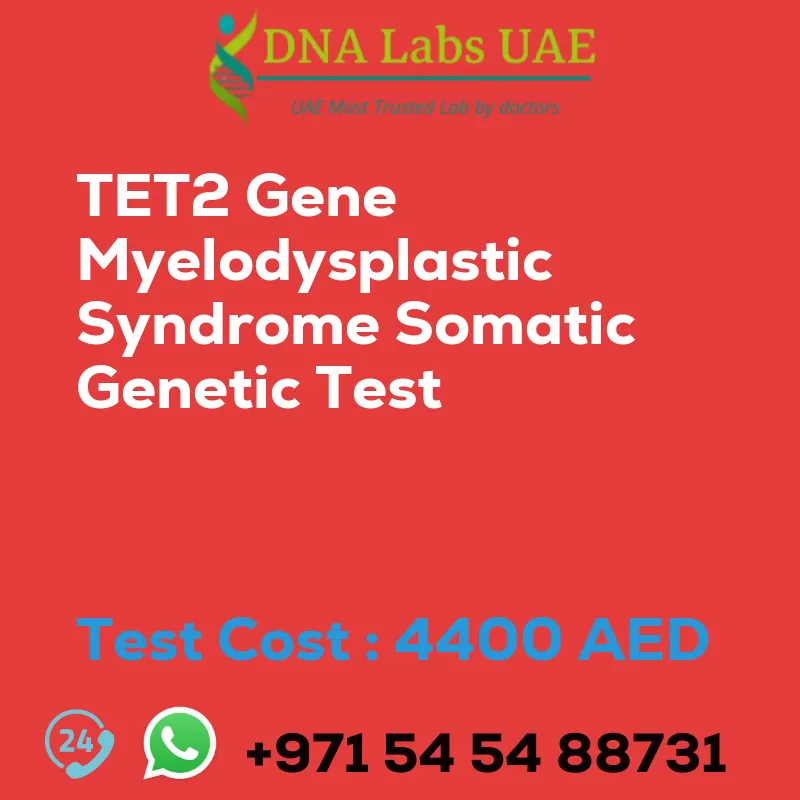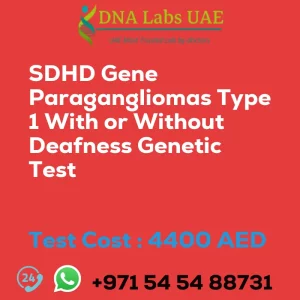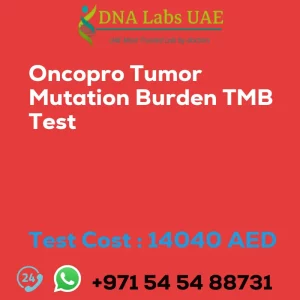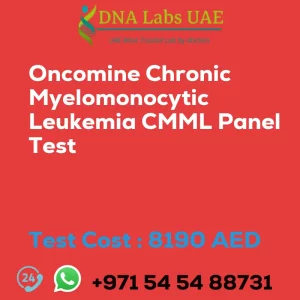TET2 Gene Myelodysplastic syndrome somatic Genetic Test
At DNA Labs UAE, we offer the TET2 Gene Myelodysplastic syndrome somatic Genetic Test to help diagnose and manage patients with myelodysplastic syndrome (MDS). This genetic test analyzes the TET2 gene, a tumor suppressor gene that plays a crucial role in regulating DNA methylation and controlling gene expression.
Test Details
Myelodysplastic syndrome is a group of blood disorders characterized by abnormal production and maturation of blood cells in the bone marrow. Somatic mutations in the TET2 gene have been associated with MDS and are considered driver mutations, meaning they contribute to the development and progression of the disease.
The TET2 Gene Myelodysplastic syndrome somatic Genetic Test utilizes Next-Generation Sequencing (NGS) technology to analyze the DNA sequence of the TET2 gene and other relevant genes. This allows for the detection of various genetic alterations, including point mutations, insertions, deletions, and gene fusions.
By analyzing the TET2 gene and other relevant genes, somatic NGS genetic testing can provide valuable information about the genetic landscape of a patient’s MDS. This includes the presence of driver mutations and potential therapeutic targets. This information can help guide personalized treatment strategies and improve patient outcomes.
Test Components
- Price: 4400.0 AED
- Sample Condition: Blood or Extracted DNA or One drop Blood on FTA Card
- Report Delivery: 3 to 4 Weeks
- Method: NGS Technology
- Test Type: Cancer
- Doctor: Oncologist
- Test Department: Genetics
Pre Test Information
Prior to undergoing the TET2 Gene Myelodysplastic syndrome somatic Genetic Test, it is important to provide the clinical history of the patient who is going for the test. Additionally, a genetic counseling session may be conducted to draw a pedigree chart of family members affected with TET2 Gene Myelodysplastic syndrome, somatic NGS Genetic DNA Test gene TET2.
Genetic counseling can help assess the risk of developing MDS and provide information about inheritance patterns and genetic testing options for family members.
Conclusion
The TET2 Gene Myelodysplastic syndrome somatic Genetic Test offered by DNA Labs UAE is a valuable tool in the diagnosis and management of myelodysplastic syndrome. By analyzing the TET2 gene and other relevant genes, this genetic test can provide important information about the genetic landscape of a patient’s MDS and help guide personalized treatment strategies.
If you suspect you or a loved one may have MDS, we recommend consulting with an oncologist and considering the TET2 Gene Myelodysplastic syndrome somatic Genetic Test for a comprehensive understanding of the disease.
| Test Name | TET2 Gene Myelodysplastic syndrome somatic Genetic Test |
|---|---|
| Components | |
| Price | 4400.0 AED |
| Sample Condition | Blood or Extracted DNA or One drop Blood on FTA Card |
| Report Delivery | 3 to 4 Weeks |
| Method | NGS Technology |
| Test type | Cancer |
| Doctor | Oncologist |
| Test Department: | Genetics |
| Pre Test Information | Clinical History of Patient who is going for TET2 Gene Myelodysplastic syndrome, somatic NGS Genetic DNA Test. A Genetic Counselling session to draw a pedigree chart of family members affected with TET2 Gene Myelodysplastic syndrome, somatic NGS Genetic DNA Test gene TET2 |
| Test Details |
The TET2 gene is a tumor suppressor gene that plays a crucial role in regulating DNA methylation, a process that helps control gene expression. Mutations in the TET2 gene have been associated with various hematological malignancies, including myelodysplastic syndrome (MDS). Myelodysplastic syndrome is a group of blood disorders characterized by abnormal production and maturation of blood cells in the bone marrow. Somatic mutations in the TET2 gene are commonly found in patients with MDS and are considered a driver mutation, meaning they contribute to the development and progression of the disease. Somatic NGS (Next-Generation Sequencing) genetic testing is a technique used to analyze the DNA sequence of specific genes or regions of the genome. It allows for the detection of various genetic alterations, including point mutations, insertions, deletions, and gene fusions. In the context of MDS, somatic NGS genetic testing can be used to identify mutations in genes such as TET2, which can help with diagnosis, prognosis, and treatment decision-making. By analyzing the TET2 gene and other relevant genes, somatic NGS genetic testing can provide valuable information about the genetic landscape of a patient’s MDS, including the presence of driver mutations and potential therapeutic targets. This information can help guide personalized treatment strategies and improve patient outcomes. |








